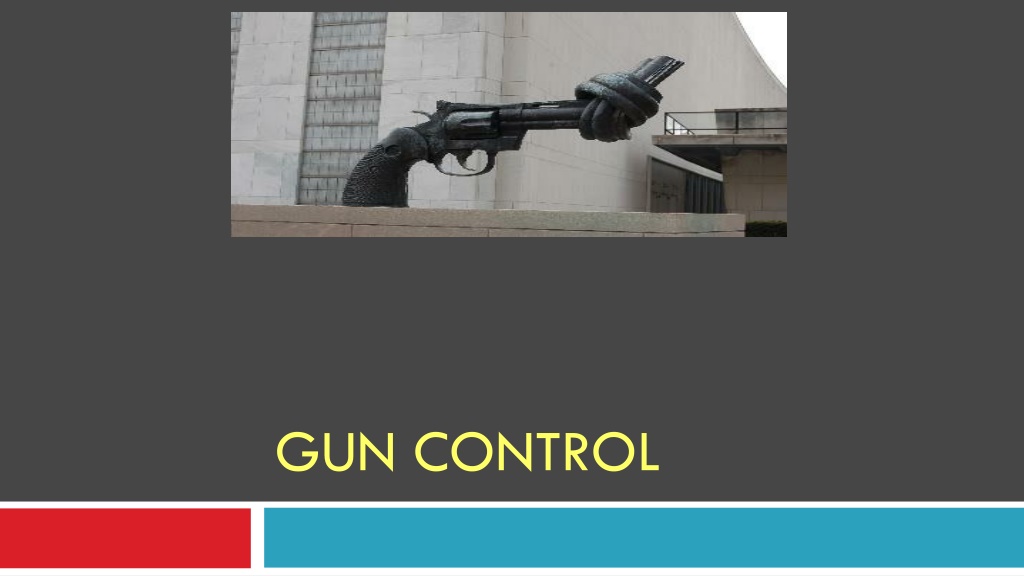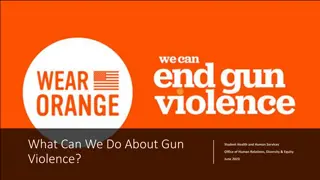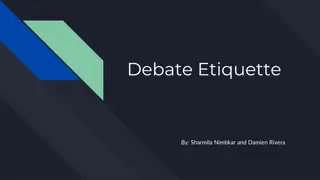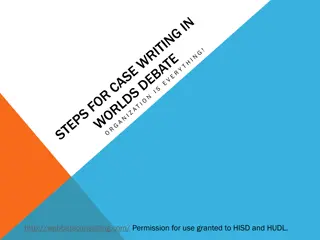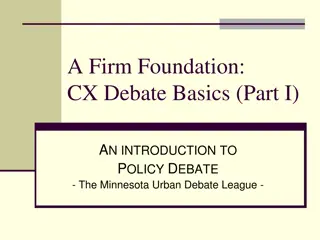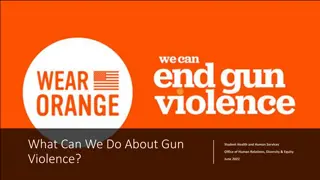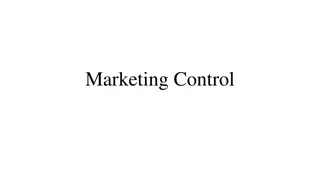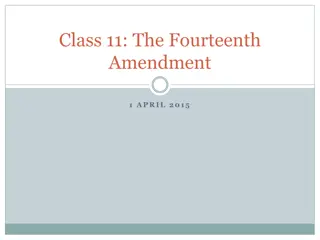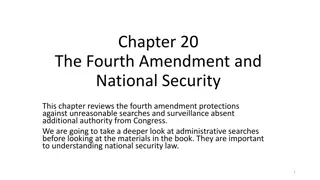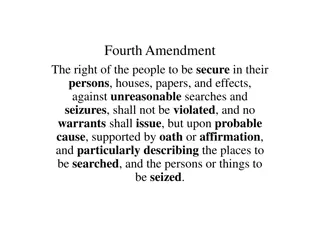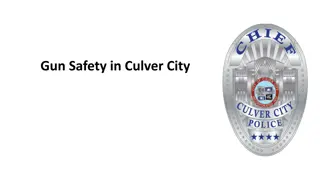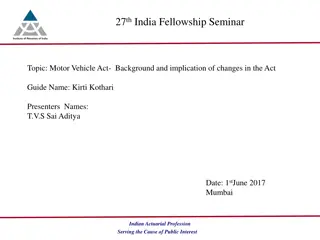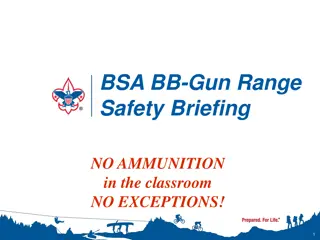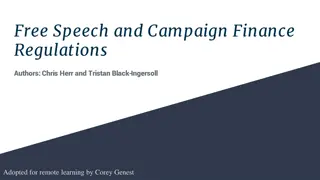Understanding Gun Control and the Second Amendment Debate
The discussion on gun control and the Second Amendment is a contentious issue in the US, with frequent mass shootings leading to calls for stricter regulations. The Second Amendment guarantees the right to bear arms, but the high incidence of gun-related crimes raises concerns about public safety and the relevance of this constitutional provision. Comparative perspectives from other countries with strict gun laws shed light on possible alternatives. Arguments for and against private gun ownership underscore the complex nature of the debate.
Download Presentation

Please find below an Image/Link to download the presentation.
The content on the website is provided AS IS for your information and personal use only. It may not be sold, licensed, or shared on other websites without obtaining consent from the author. Download presentation by click this link. If you encounter any issues during the download, it is possible that the publisher has removed the file from their server.
E N D
Presentation Transcript
The Second Amendment to the U.S. Constitution "A well regulated militia, being necessary to the security of a free state, the right of the people to keep and bear Arms, shall not be infringed." What does this mean to you? How do you feel about gun control?
Problem In the US, mass murders committed with guns are (way too) frequent: 49 people in an Orlando nightclub in 2016 20 children and 6 adults at an elementary school in Newtown, CT, in 2012 58 killed, 2017, In Las Vegas crowd. 49 killed, 2016, in a gay nightclub 32 killed, 2007, Virginia Tech. 25 adults and an unborn child killed, 2017 in a small church in Texas. 2019 May 7, mass shooting at STEM School, Colorado As of December 1, which is the 335th day of the year, there have been 385 mass shootings in the U.S., according to data from the nonprofit Gun Violence Archive (GVA)
Gun Regulation in other countries The United Kingdom has some of the strictest gun legislation in the world. There is practically no organized right to keep and bear arms lobby in the UK. Australia both State and Federal Governments have enacted increasingly restrictive firearms legislation. In China, citizen have no right to keep and bear arms.
Why Gun Control is Not Enough (Jeff McMahan)
MAIN ARGUMENT (1) Gun ownership increases violence, not safety. (2) The second amendment is obsolete. (3) Banning guns would be more effective than alcohol/drug prohibition. (4) We have a right to security, not a right to self-defense with guns. (C) Therefore, private gun ownership should be banned.
ARGUMENT FOR (1) (1A) We have more guns than other developed societies and more violence. (1B) Like nuclear arms race: to compete, criminals get more powerful guns, better strategy. (1C) Ordinary conflicts escalate. (1D) There are more accidents and mistakes. (1E) Bad guys get good guys guns. (1F) Police are weakened. MAIN ARGUMENT (1) Gun ownership increases violence, not safety. (2) The second amendment is obsolete. (3) Banning guns would be more effective than alcohol/drug prohibition (4) We have a right to security, not a right to self-defense with guns. (C) Private gun ownership should be banned.* *Target shooting enthusiasts can rent at the range
MAIN ARGUMENT (1) Gun ownership increases violence, not safety. (2) The second amendment is obsolete. (3) Banning guns would be more effective than alcohol/drug prohibition (4) We have a right to security, not a right to self- defense with guns. (C) Private gun ownership should be banned. ARGUMENT FOR (2) (2A) In our society today, democratic procedures are best way of challenging government, not armed insurrection. (2B) We now rely on Army, Navy, etc. for national defense.
MAIN ARGUMENT (1) Gun ownership increases violence, not safety. (2) The second amendment is obsolete. (3) Banning guns would be more effective than alcohol/drug prohibition (4) We have a right to security, not a right to self- defense with guns. (C) Private gun ownership should be banned. ARGUMENT FOR (3) (3A) Desire for drugs/alcohol is independent of what other people may do. (3B) Desire for guns depends on perceived security.
MAIN ARGUMENT (1) Gun ownership increases violence, not safety. (2) The second amendment is obsolete. (3) Banning guns would be more effective than alcohol/drug prohibition (4) A gun ban would not violate our fundamental rights. (C) Private gun ownership should be banned. ARGUMENT FOR (4) (4A) The relevant fundamental right is the right to security against attack (4B) That right is respected by a policy that reduces attacks while also reducing one method of self-defense
Is There a Right to Own a Gun? by Michael Huemer
Individuals have a right to own firearms. This right is significant in view both of the role that such ownership plays in the lives of firearms enthusiasts and of the self-defense value of firearms. This right is not overridden by the social harms of private gun ownership. These harms have been greatly exaggerated and are probably considerably smaller than the benefits of private gun ownership.
Given the presumption in favor of liberty, there is a right to own a gun, unless there are positive grounds for denying such a right. Are there such grounds?
We all agree: We do not have a right to Harm others Treat others as mere means Use others without their consent Owning a gun is not one of those things. We do not prohibit activities just because they can make it easier for one to perform a wrong.
The risks associated with normal ownership and recreational use of firearms are minimal. Approximately 77 million Americans own guns, the accidental death rate for firearms is about .3 per 100,000 population. Compare: the average citizen is 19 times more likely to die in accidental fall, and 50 times more likely to die in car accident, than to die as a result of a firearms accident.
McMahan argues: when you have a gun, instead of fistfight you shoot the opponent. Huemer: Only very atypical individuals would shoot their opponents. McMahan s claims are wrong: In 75 counties in the US over 89% of adult murderers had prior criminal records as adults. So gun ownership does not typically impose excessive risks on others.
In general, the fact that restricting an activity has beneficial consequences does not show that no weight at all should be assigned to the freedom to engage in it: * Compare: suppose that taking my car from me and giving it to you increases total social welfare. It would not follow that I have no claim at all on my car.
Is the right to own a gun significant? Yes, on the basis of (1) the importance of gun ownership in the lives of firearms enthusiasts, and (2) The right of self-defense.
(1) the importance of gun ownership in the lives of firearms enthusiasts Consider activities whose primary value is recreational or pleasure-enhancing: non- reproductive sexual activity, reading fiction, watching television or movies Would it be rational to give up all those activities if by doing so one could increase one s life expectancy by, say, five minutes? Many gun owners appear to derive enormous satisfaction from the recreational use of firearms, and it is no exaggeration to say that for many, recreational shooting is a way of life. Consequently: A prohibition on firearms ownership would constitute a major interference in the lives of recreational gun users.
(2) The right of self-defense. 1. The right of self-defense is an important right. 2. A firearms prohibition would be a significant violation of the right of self-defense. 3. Therefore, a firearms prohibition would be a serious rights-violation.
Consider this scenario: A killer breaks into a house. The accomplice holds the victim down while the killer stabs the victim to death. The killer commits the most serious kind of rights-violation possible. Most would agree that the accomplice s action is close to the murder s in degree of wrongness.
What makes it so wrong is that it prevents the victim from either defending himself or fleeing from the killer that is, it violates the right of self-defense.
Consider this now: The victim has a gun by the bed, which he would, if able, use to defend himself from the killer. As the killer enters the bedroom, the victim reaches for the gun, but the accomplice grabs the gun and runs away, and the killer stabs his victim to death.
The analogy between the accomplices action and a firearms prohibition: A firearms ban would require confiscating the weapons that many individuals keep for self-defense, with the result that some of those individuals would be murdered, robbed, raped, or seriously injured. If the accomplice s action is a major violation of the right of self-defense, then gun prohibition seems to be about equally serious as a violation of the right of self-defense.
Consider some objections: * With a gun ban the government has strong reasons for confiscating the guns to save the lives of others, but it is not true of the accomplice in example. But this means that the gov. can takes away my rights! * The example differs from a gun ban: the murder is imminent at the time the accomplice takes the gun away. This seems to be morally irrelevant. Suppose that the accomplice decides to take the victim s gun away from him the day before the aggression.
Firearms prohibition might be justified, if the reasons for prohibition are strong enough to override that right. What must the cost/benefit ratio be like, for the right to own a gun to be overridden? 1. The harms of private gun ownership have been greatly exaggerated. 2. The benefits of private gun ownership are large and greater than the harms. 3. The harms would have to be many times greater than the benefits in order to override the right to own a gun.
1. The harms of private gun ownership have been greatly exaggerated. The 43-to-1 Statistic: One argument claims that a gun kept in the home is 43 times more likely to be used in a suicide, criminal homicide, or accidental death than it is to kill an intruder in self-defense. * This is misleading. To assess the benefits of guns, one would have to examine the frequency with which guns prevent crimes, rather than the frequency with which they kill criminals. (Showing your gun is enough in many cases) * A second problem is that 37 of the 43 deaths were suicides. * A third problem is that this study only counted as self-defense cases that were so labeled by the police
A second type of argument against guns is comparisons of homicide rates between the United States and other industrialized democracies. (i) Jurisdictions with stricter gun laws tend to have higher crime rates. (ii) Shifts to more permissive gun laws tend to be followed by drops in crime rates. (iii) Areas with higher gun ownership rates have lower crime rates. (iv) Historically, crime rates have fluctuated with no discernible pattern as the civilian gun stock has increased drastically. Thus, at a minimum, one cannot claim justified belief that gun prohibition would be overall beneficial.
In order to be justified as a case of the overriding of prima facie rights, gun prohibition would have to save many times as many lives as it cost, for: 1. It is wrong to murder a person, even to prevent several other killings. 2. A violation of a person or group s right of self-defense, predictably resulting in the death of one of the victims, is morally comparable to murder. 3. If it is wrong to commit a murder to prevent several killings, then it is wrong to commit a rights- violation comparable to murder to prevent several killings. 4. So, it is wrong to violate a person or group s right of self-defense, predictably resulting in the death of one of the victims, even to prevent several killings. 5. Therefore, it is wrong to violate a group of people s right of self-defense, predictably resulting in the deaths of many of the victims, even to prevent several times as many killings. 6. Gun prohibition would violate a group of people s right of self-defense, predictably resulting in the deaths of many of the victims.
Conclusion: Therefore, gun prohibition is wrong, even if it would prevent several times as many killings as it contributed to.
